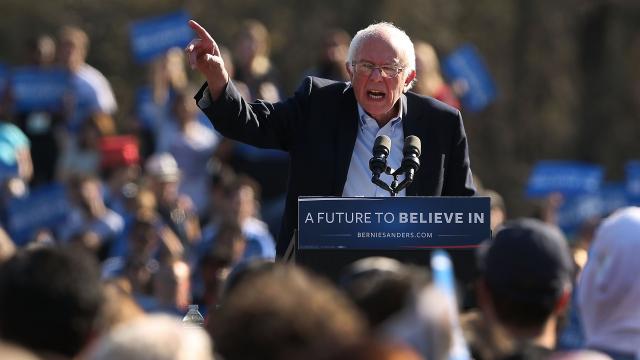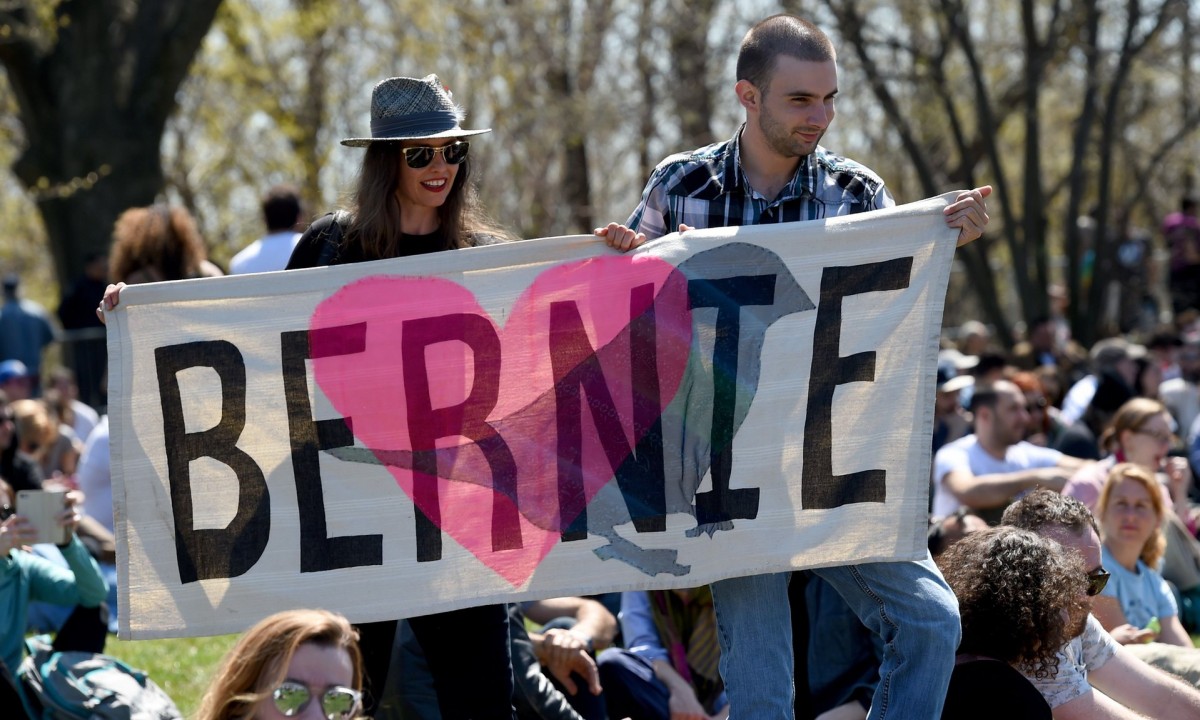
In its time the borough of Brooklyn has produced an iconic bridge, Mae West, Al Capone and a substantial part of the U.S. Navy. Last week, it hosted a critical debate about the future of left politics, not just in America but across the western world.
After slugging it out on live TV for two hours, Bernie Sanders and Hillary Clinton stood up to make their closing pitches. Sanders, a Brooklyn native, focused on inequality and overwhelming power of money in U.S. politics. He called for free healthcare, free tuition at universities, the breakup of big banks and forcing the rich to pay their taxes.
Clinton responded: “You know, of course we have economic barriers ... But we also have racial barriers, gender barriers, homophobic barriers, disability barriers.” The subtext could not have been clearer: forget fighting Wall Street – a more liberal capitalism is all you’re going to get.
Defining the race as a choice between class and identity, between economic justice and social justice, was Clinton’s masterstroke. If it works, Sanders will be sunk by a combination of Wall Street money and millions of black votes in the southern states. The latter backed Clinton in some places eight or nine to one.
Thereafter the script will write itself. Whether fronted by Donald Trump or Ted Cruz, the Republicans will lose. Both men are, in reality, engaged in a revenge attack on their party’s centrist establishment for failing to stop President Obama’s reforms.
This, in turn, is a sort of revenge attack on history itself. The demography of the U.S. has changed so fast that, even though they dominate the airwaves, the views of rightwing religious bigots are at odds with the way 60% of Americans actually live.
So for all the global media’s obsession with Trump, the real question in this election is: what kind of progressive politics will govern America – one that leaves the power of money intact or, as in the great reforming eras of U.S. politics, fundamentally re-orders capitalism?
Clinton has designed herself as the continuity candidate with Obama. After Lehman Brothers collapsed in 2008 Bush and Bernanke saved Wall Street. But it was Obama who ensured the rescue came cost-free to America’s 0.1%. Throughout two terms Obama has presided over wage stagnation. His signal reform – healthcare – brought 11 million people into the private insurance system; but that leaves 29 million still uninsured, and the healthcare industry still fighting its rearguard action through the courts.
America’s progressive majority needs not just a Democratic president. It needs a presidential candidate who can deliver, either this year or by mid-term, a majority in both houses of Congress and who is determined to engineer a liberal supreme court for a generation. Whether on the issues of class or identity, that is the war that needs to be fought. And only Bernie Sanders can win it.
Why? In the first place, because the majority needed in Congress can only be delivered by high Democratic turnout. The system is so gerrymandered at local level that the Democrats need an 8-10% lead to win a slim majority in the House. Sanders, unlike Clinton, has a clear lead over any Republican candidate in polls of all voters. Indeed, 33% of Sanders’s supporters in one March poll said they could not bring themselves to vote for Clinton if selected.
With the right fired up for a last-ditch defense of social conservatism, racism and private healthcare, only a candidate who reaches deep into the anger and discontent of the progressive side – and, indeed, who crosses over the divide itself – can ensure a legislative majority. That goes just as much for policies to combat racism, sexism and homophobia as it does for those needed to fight inequality.
There is zero chance of Clinton achieving that. Though she has shifted her program to the left rhetorically, her deep roots among the free-market elite and her inability to engage with Sanders’s young supporters militate against the kind of bandwagon you need to enact generational change.
Sanders has proved inept in handling the black vote in the south. His justification that the south is “conservative” is a euphemism for the fact that Clinton has plugged into the religious and political patronage system there, and he has not. Instead of excuses, he should be pitching hard to the southern black delegates he’s going to need to defeat Clinton at the convention.
But Sanders has something that progressive America needs: the ability to build and sustain a movement. Since 2011, the huge weakness of the progressive activist generation has been their tendency to flip from heroic actions – Wisconsin, Occupy, the Black Lives Matter movement – to footsolider status in short-lived presidential campaigns.
By contrast, the right has a grassroots movement that, aided by the dollars of the Koch brothers, will harass and sabotage the next Democratic president. It is this movement that has delivered the local counter-revolutions on abortion; that harries migrants; that passes bylaws disenfranchising black voters.
The progressive majority in America needs to become a counter-movement. It needs to occupy not just the occasional park, university or road junction. It needs to occupy the actual political space now squatted by the right: the town hall, the state Capitol, the courtroom, the education board, the voter registration system.
That movement would have to neutralize rightwing working-class opposition by appealing – across the formal divide of politics – to the desire among many on the right for economic justice. It can only do that by fighting the power and privilege of the very people pouring money into the Clinton campaign. It’s hard to imagine Hillary Clinton doing that. A lifetime in elite politics and a bank account enlarged with speaker fees from Goldman Sachs stand in the way. With Bernie Sanders you don’t need to imagine.
3 WAYS TO SHOW YOUR SUPPORT
- Log in to post comments













Comments
Javari replied on
Bernie wouldn't have changed squat
Laughable. First of all he's old. Second of all he's mainstream status quo with minor differences. Third he's Jewish so he isn't about to do anything to Israel or the central banks owned by Jewish families Rockefeller and Rothchild.
DH Fabian replied on
Realistically
Huh? Breaking the power of capitalism when we're in the midst of celebrating middle class elitism?
Give this a little more thought. This generation so strongly believes in the success of our deregulated capitalism that they think everyone is able to work, there are jobs for all, therefore no need for poverty relief. It wouldn't make sense to disrupt such a system.